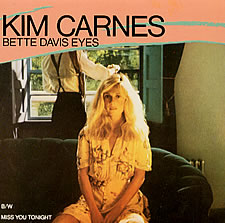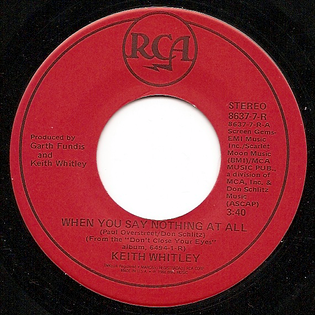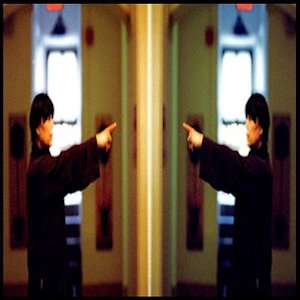
"Bette Davis Eyes" is a song written and composed by Donna Weiss and Jackie DeShannon in 1974. It was originally recorded by DeShannon in that year for her album New Arrangement but it was made popular by American singer Kim Carnes in 1981 when it spent nine non-consecutive weeks on top of the U.S. Billboard Hot 100. The song was #1 for five weeks, interrupted for just one week by "Stars on 45" before it returned to the top spot for another four weeks and became Billboard's biggest hit of the year. The single also reached No. 5 on Billboard's Top Tracks charts and No. 26 on the Dance charts. It was also a No. 1 hit in 21 countries and peaked at No. 10 in the United Kingdom, to date her only Top 40 hit in that country. It also reached No. 2 in Canada for twelve consecutive weeks, and was the No. 2 hit of 1981 in that country after "Stars on 45".

The Motels are an American new wave band from Berkeley, California, that is best known for the singles "Only the Lonely" and "Suddenly Last Summer", each of which peaked at No. 9 on the Billboard Hot 100, in 1982 and 1983, respectively. In 1980, The Motels song "Total Control" reached No. 7 on the Australian chart, and their song "Danger" reached No. 15 on the French chart.
The Paradise Motel are an independent Australian rock band that formed in Hobart, Tasmania in 1994. They relocated to Melbourne and issued two albums on Mushroom Records, Still Life (1996) and Flight Paths (1998) before moving to the United Kingdom where they released a third, Reworkings (1999), before disbanding in early 2000. The group reformed in January 2008 and released the albums, Australian Ghost Story (2010), I Still Hear Your Voice at Night (2011) and Oh Boy (2013).

"Tender" is a song by English rock band Blur from their sixth studio album, 13 (1999). Written by the four band members about Blur frontman Damon Albarn's breakup with musician turned painter Justine Frischmann, the song became Blur's eleventh top-10 hit on the UK Singles Chart, debuting and peaking at number two on 28 February 1999. It also reached the top 20 in Greece, Iceland, Ireland, Italy, New Zealand, Norway, and Spain.

"When You Say Nothing at All" is a country song written by Paul Overstreet and Don Schlitz. It was a hit song for four different performers: Keith Whitley, who took it to the top of the Billboard Hot Country Singles chart on December 24, 1988; Alison Krauss, whose version was her first solo top-10 country hit in 1995; Irish singer Frances Black, whose 1996 version became her third Irish Top 10 single and brought the song to the attention of Irish pop singer Ronan Keating, whose 1999 version was his first solo single and a number-one hit in the United Kingdom, Ireland, and New Zealand.

Motels is the first studio album by new wave band The Motels, recorded in the spring of 1979 and released in the fall. It was produced by John Carter. It peaked at #175 on Billboard's album chart in December.

...So the Story Goes is the second solo studio album by Martha Davis, who is better known as the lead singer for the band The Motels.

This is the seventh studio album by the band The Motels, recorded with current touring band whom Martha Davis has been working with for a few years. When Matthew Morgan, a producer-engineer from Portland met up with The Motels, the resulting work became the new album, This.
Beautiful Life, also known as Beautiful Life: A Slight Miscalculation, is the third solo studio album by Martha Davis, who is better known as the lead singer for the band The Motels. The 2008 album is a concept album Martha developed with some help from Matthew Morgan about her mother's life and death by suicide.

Funny Lady is the soundtrack album of the 1975 musical film of the same name, starring Barbra Streisand. Released by Arista Records on March 15, 1975, arranged, conducted, and coordinated by Peter Matz, the album's fifteen tracks are performed by Streisand, James Caan, and Ben Vereen. A sequel to the 1968 musical comedy-drama Funny Girl, the songs extend the semi-biographical account of the life of American performer Fanny Brice. Funny Lady also included songs written by Brice's third husband Billy Rose. New music by Kander and Ebb included "How Lucky Can You Get", the album's only single, released in April 1975.

"Shame" is a song by American new wave band The Motels, which was released in 1985 as the lead single from their fifth studio album Shock. The song was written by Martha Davis and produced by Richie Zito. "Shame" peaked at number 21 on the US Billboard Hot 100.

"Remember the Nights" is a song by American new wave band The Motels, which was released in 1983 as the second single from their fourth studio album Little Robbers. The song was written by Martha Davis and Scott Thurston, and produced by Val Garay. "Remember the Nights" peaked at number 36 on the US Billboard Hot 100.

"Shock" is a song by American new wave band The Motels, which was released in 1985 as the second single from their fifth studio album Shock. The song was written by Martha Davis and Scott Thurston, and produced by Richie Zito. "Shock" peaked at number 84 on the US Billboard Hot 100.

"Whose Problem?" is a song by American new wave band The Motels, which was released in 1980 as the third and final single from their second studio album Careful. The song was written by Martha Davis and produced by Carter. "Whose Problem?" failed to chart in the US, but reached number 42 in the UK Singles Chart and number 43 in the Australian Kent Music Report chart.

"Danger" is a song by American new wave band The Motels, which was released in 1980 as the second single from their second studio album Careful. The song was written by Martha Davis and Tim McGovern, and produced by Carter. "Danger" saw limited commercial success in the US, but generated more chart action in Australasia, peaking at number 88 in Australia and 30 in New Zealand.

"Take the L" is a song by American new wave band The Motels, which was released in 1982 as the second single from their third studio album All Four One. The song was written by Marty Jourard, Martha Davis and Carter, and produced by Val Garay. "Take the L" peaked at number 52 on the US Billboard Hot 100.

"Tell It to the Moon" is a song by American singer-songwriter Martha Davis, which was released in 1988 as the second single from her debut solo studio album Policy. The song was written by Diane Warren and produced by Richie Zito. "Tell It to the Moon" failed to chart in the US, but peaked at number 65 on the Australian Music Report chart.














